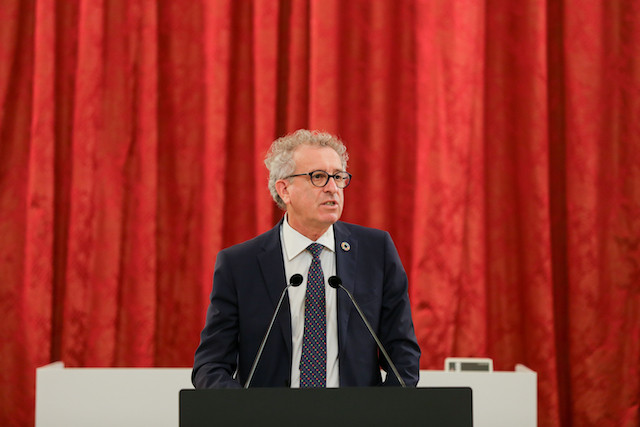“Extraordinary times require extraordinary measures,” Gramegna (DP) said presenting the state’s budget for next year in parliament. The government expects to spend €21.8bn in 2021, compared to revenue of €19.3bn, he said, adding that slowing down spending for the sake of a balanced budget would be sending the wrong signal.
“If that means that the level of debt will hover around the limit of 30% for a few years before going down again, then that is a better perspective than that of an ideological austerity programme or sacrificing innovation and investments,” the finance minister said.
Where the money will go
An 11% budget increase for the housing ministry was among the investments cited by Gramegna, with a fund created this year for the government to acquire land for construction to rise to €141m next year and reach €248m in 2024.
Spending on hospital infrastructure will also go up, with €61m to be spent next year--for projects including new premises for the CHL, and the Südspidol in the south of the country. By 2024, the government expects to further double spending on hospitals.
Around €1bn will be spent on an employment fund that finances training and job retention measures, up from €771m in 2020. Climate spending will also receive a small boost, from €533m this year to €547m next year, with rail and tram infrastructure as well as subsidies for electronic mobility the biggest beneficiaries.
A fund to finance innovative enterprises and the budget for the country’s university and research institutions will also increase, with a 17% budget hike planned for the digitalisation ministry.
Already announced by prime minister Xavier Bettel during his state of the nation speech, the government will extend into next year the partial unemployment programme--under which the state pays wages for employees working reduced hours because of the pandemic.
Luxembourg’s virus rescue package amounts to around €11.2bn, making it one of the most generous in Europe, Gramegna said. The European Commission on Tuesday announced it would continue suspending some state aid rules until June next year. Luxembourg is now assessing what additional measures could be taken to shore up the country’s economy, Gramegna said. “When we help companies, then we also help people.”
Not the time for tax hike
Despite the budget shortfall, Gramegna said the government was not planning any major tax increases or rebates. “Now, in the middle of the crisis, is not the time to carry out a general tax reform,” he said, even though an overhaul of the tax system forms part of the coalition programme and should be implemented by 2023.
Isolated measures, however, form part of the budget policy package. This includes the abolition of a stock options regime which allowed companies to attract high earners by paying some of their salary in low-taxed stock option.
In addition, specialised investment funds (SIFs) holding real estate assets will be taxed 20% on their direct and indirect revenue.
The government also hopes to counter real estate speculation by making accelerated amortisation less attractive. The scheme was introduced in 2002 to prompt investors to create more rental housing. But it has resulted in investors snapping up properties to save taxes, driving up prices, Gramegna said.
On the other hand, the government will incentivise renovating older properties with tax breaks.
To boost its role as a centre for sustainable finance, subscription taxes for funds meeting EU criteria on sustainable and green investment will be lowered to as little as 0.01%.
At the same time, a CO2 tax will raise the price of petrol and diesel by around 5 cents per litre next year. “With this increase, Luxembourg makes the consumption of climate damaging fossil fuels less attractive,” Gramegna said, adding that the measure was not aimed at generating revenue for the state. The additional cash windfall will be spent on climate measures, he said.
How it all adds up
The state--through the so-called “Administration centrale” budget--will be spending €21.8bn next year, compared to revenue of €19.3bn. After a positive balance sheet in 2018 and 2019, the deficit should amount to €2.5bn in 2021.
The overall public administration however also includes the finances of Luxembourg’s communes and the country’s social security system.
The latter took a hit this year with its surplus falling from €1.2bn last year to €900m this year due to increased spending on benefits, such as childcare leave for parents during lockdown. The surplus is expected to further fall to €755m next year.
The country’s communes--despite a deficit of €213m this year--should close 2021 with a surplus of €2m, Gramegna said.
The overall deficit of the public administration--including the “Administration centrale”, communes and social security--should amount to €4.4bn this year and €1.75bn next year, Gramegna said.
Public debt will be at 29.4% next year, Gramegna said, up from 27.4% this year. Without the impact of the pandemic, the finance minister said it would be at below 25%.
